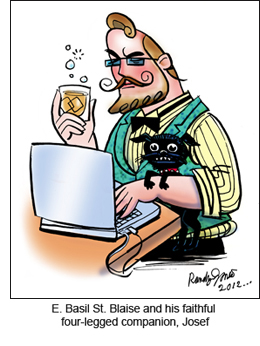E. Basil St. Blaise
A St. Blaise of Glory
 Stated simply, for E. Basil St. Blaise, the noted author and critic, life is art and entertainment, and art and entertainment is…are life. E. Basil grew up with his doting father, Basil E. and a surrogate mother he knew only as Estrellita in a small Midwestern town some years before the first remake of A Star is Born. His earliest memories are of freshly baked dingleberry pies, Uncle Miltie on the RCA television, Uncle Stu on Estrellita and amateur theatre at the famed Hogshead Abattoir (where they routinely butchered Williams, Odets and Genet). He read everything he could get his hands on, usually before it was hung in the privy, and he spent countless nights nestled under the covers with his flashlight and a jar of Estrellita’s cold cream.
Stated simply, for E. Basil St. Blaise, the noted author and critic, life is art and entertainment, and art and entertainment is…are life. E. Basil grew up with his doting father, Basil E. and a surrogate mother he knew only as Estrellita in a small Midwestern town some years before the first remake of A Star is Born. His earliest memories are of freshly baked dingleberry pies, Uncle Miltie on the RCA television, Uncle Stu on Estrellita and amateur theatre at the famed Hogshead Abattoir (where they routinely butchered Williams, Odets and Genet). He read everything he could get his hands on, usually before it was hung in the privy, and he spent countless nights nestled under the covers with his flashlight and a jar of Estrellita’s cold cream.After graduating in the top 50 of his admittedly small high school class at Roscoe Arbuckle Memorial he fulfilled his life-long fantasy of coming to New York to attend the John Derek Junior College for the Performing Arts. Though he stayed for just one all-too-brief semester before a civil suit forced the institution to shutter its doors, he absorbed all the sights, sounds and putrefactive smells that Broadway and the Big City had to offer. It was for the school newspaper, Thespian Tendencies, which he penned his first bylined review of an Off Broadway production of Waiting for Godot performed in Tagalog. His brief comment (“I hope these waiters kept their job at Horn & Hardart’s.”) published under the heading Kritic’s Korner was a hit with readers, although his editor let him go for failing to fill his allotted 6-inch column.
Upon his return to “the sticks”, St. Blaise began honing his “short, but sour” reviews in a wide range of publications including Penny Savers, church newsletters, public health pamphlets and, most notably, the venerable Ant Farmer’s Almanac. He critiqued everything from local art exhibitions (“This Sunday painter should follow the Lord’s example and rest on the seventh day.”) to state fair beauty pageants (“As Charlotte wrote in her web: SOME PIG.”) to quilting bees (“May they dip their needles in curare.”) to barber shop quartets (“Where’s a straight razor when you need one?”) A double-bill at the local Bijou of Rashomon and The Amazing Colossal Man proved to be a revelation to the budding critic and he vowed from that day forth to “Love the sinner, but hate the cinema.”
He clawed his way through the journalistic jungle with a steady stream of submissions to many of the most prestigious publications of the 1970s, appearing only occasionally in their letters columns under a string of assumed noms de pan. His scathing potshots at other critics’ darlings like The Godfather (“Do Wops.”), Bonnie and Clyde (“Should be Dunaway with.”), Nashville (“He whore.”), A Clockwork Orange (“Kubrick-a-brack.”), and The French Connection (“The dope’s in the director’s chair.”) did catch the attention of the editors of Cinema Nihilisme in France who began reproducing his denunciations. As fate would have it, the July, 1976 edition was purchased by both Henri Langlois, France’s greatest cineaste and founder of the Musée du Cinema and Pauline Kael, the New Yorker’s preeminent critic of the day. St. Blaise’s two-word review of the newly-released Taxi Driver (“Hack job.”) was printed in English on page 84. Langlois did not understand it and Kael’s copy was missing pages 82 through 86 due to a printer’s error.
St. Blaise’s New Trails
In 1962 St. Blaise helped establish the adult film industry’s first award for excellence, the Wanky, and was there in the back row of the New Adonis Theatre in New York’s Times Square for its inaugural presentation. The Gland Prize winner that year was the infamous Long Day’s Journey into Mike accepted by it’s star Lash Lagroine. The Palme D’Whore for best peep show went to The Longest Lay (which ironically took 96 quarters to view in its entirety.)
He has been guest lecturer at the Earl Dittman Correspondence School for Constructive Criticism since 2002. As a film programmer he has organized the Fire Island Selected Shorts Festival, the Crawford, Texas Barking Spider Comedy Jamboree and the Surveillance Tape Bloopers Fest in Langley, Virginia. He has been consulted on assembling the action film video library of North Korea’s Kim Jong-il and a Whitney Huston DVD collection for a reclusive collector somewhere in Abbottabad, Pakistan.
He is the author of numerous books on the lively arts including Your Sleeve’s Too Short to Box with God on the history of bad costume design and The Camera’s Bleary Eye, a history of focus pullers with macular degeneration. He has ghost written several unauthorized showbiz biographies including Loni: MILF No More and Haley Joel: After the Lollipops. He is currently working on a collection of his classic criticism and a roman á clef concerning a big star with a drinking problem whose arrest and anti-Semitic tirade threaten to ruin his career, tentatively entitled You’ll Never Eat Lox in This Town Again.


